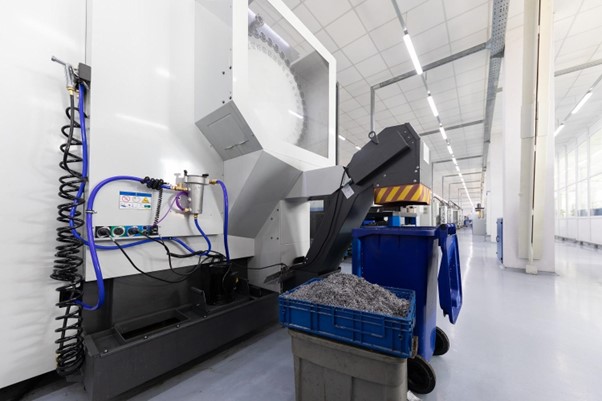In the dynamic world of manufacturing, Computer Numerical Control (CNC) machining stands out as a beacon of innovation. This process, which involves computer-controlled machine tools crafting custom parts with impeccable precision, has become indispensable in modern production.
But what truly fuels this transformation? The materials we choose. The foundation of any CNC project, the right material can elevate a design from good to extraordinary.
So, let’s journey together into the heart of CNC machining, exploring the materials that make our creations come alive.
Understanding CNC Machining
What is CNC Machining?
CNC, or Computer Numerical Control, refers to the automation of machine tools by means of computers executing pre-programmed sequences of machine control commands. In simpler terms, it’s like a robot taking over manual control to ensure precision and efficiency.
The Role of Materials in CNC Machining
Materials are the backbone of CNC machining. The right material ensures the product’s durability, functionality, and aesthetic appeal. With a plethora of materials available, it’s crucial to select the one that aligns with the project’s requirements.
A Deep Dive into CNC Machining Materials
1. Metals
Aluminum: A darling of the aerospace and automotive sectors, aluminum is renowned for its lightweight nature and commendable thermal conductivity. It’s a metal that promises ease of machining, but it’s not as robust as steel and can be vulnerable under high temperatures.
Stainless Steel: A staple in medical instruments and automotive parts, stainless steel boasts of its resistance to corrosion and impressive strength. However, its very strengths make it a challenge to machine, often wearing out machinery faster than softer metals.
Brass: A versatile metal, brass finds its applications in everything from plumbing fixtures to intricate electrical components. Its machinability and conductivity are its selling points, but it’s softer than other metals and can lose its sheen over time.
2. Plastics
Polycarbonate (PC): A favorite in the electronics world and automotive components, PC is cherished for its high impact resistance and crystal-clear transparency. But, like all materials, it has its Achilles’ heel—it’s less heat-resistant and can warp under intense temperatures.
Polyethylene (PE): This corrosion-resistant plastic is lightweight and finds extensive use in packaging and toy manufacturing. However, its lower strength and susceptibility to heat deformation are points to consider.
Acrylic: Acrylic shines, quite literally, in signage and optical devices due to its transparency. But its beauty can be fragile, as it’s prone to cracking under stress.
3. Composites
Carbon Fiber Reinforced Plastics (CFRP): A marvel in the aerospace and sports equipment industries, CFRP is a composite that promises a high strength-to-weight ratio and resistance to corrosion. Its superior properties come at a price, both in terms of cost and the need for specialized tooling.
Material Selection in Different Industries
1. Aerospace
In the high-stakes world of aerospace, where every gram matters, materials like aluminum and CFRP are invaluable. Their lightweight properties combined with strength make them ideal for crafting aircraft components.
2. Medical
The medical sector demands materials that can withstand sterilization and offer longevity. Stainless steel, with its durability, is a natural choice. For transparent medical devices, polycarbonate offers clarity without compromising on strength. According to MachiningToday.com, a leading manufacturing factory in China, the demand for medical devices and machinery is growing daily.
3. Automotive
In the automotive industry, where efficiency and safety are paramount, aluminum is a favorite for reducing vehicle weight. For non-critical parts, polyethylene offers a balance of durability and cost-effectiveness.
Factors to Consider When Choosing CNC Materials
Material Properties: Every material has a story to tell. Its strength, ductility, and thermal conductivity play pivotal roles in determining its suitability for a project.
Cost Implications: In the world of manufacturing, balancing material costs with machining expenses is crucial for profitability. It’s a dance of numbers, where the cheapest material might not always be the most cost-effective in the long run.
End-use Application: The final destination of the product—be it an airplane’s wing or a child’s toy—dictates the material choice. Durability, aesthetics, and functionality are all pieces of this puzzle.
At CNCFIRST, we pride ourselves on being a leading contract manufacturing factory in China, renowned for precision, quality, and affordability. If you’re seeking the best CNC manufacturing solutions without breaking the bank, look no further. Let us be your trusted partner in bringing your CNC visions to life. Engage with us, share your project details, and let’s craft excellence together. Don’t just take our word for it—experience the CNCFIRST difference for yourself!
Conclusion
In the realm of CNC machining, materials are more than just passive participants—they are the very essence of the final product. As we’ve journeyed through the myriad materials and their applications, one thing stands clear: the right material can make or break a project. As you embark on your next CNC venture, remember to weigh the pros and cons of each material, keeping the end goal in sight.
FAQs
- What is CNC Machining?
CNC Machining is a manufacturing technique where computer software directs machinery to craft custom parts with precision.
- Why is material selection crucial in CNC Machining?
The material determines the product’s functionality, durability, and aesthetic appeal.
- Which industries predominantly use aluminum in CNC Machining?
The aerospace and automotive industries favor aluminum for its lightweight properties.
- What challenges does stainless steel present in CNC Machining?
Stainless steel’s hardness can wear out machinery faster, making it challenging to machine.
- Why is Carbon Fiber Reinforced Plastics (CFRP) considered expensive?
CFRP requires specialized tooling and offers superior properties, justifying its higher cost.




